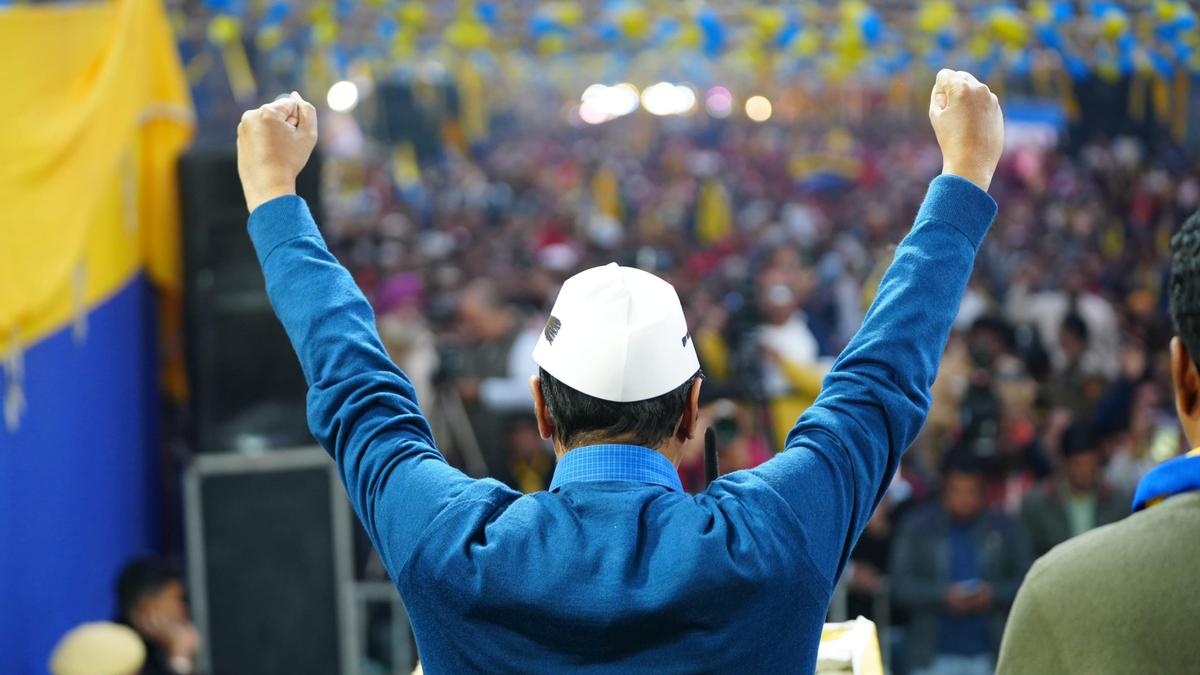On a cold January morning in 2020, just after the election dates for Delhi had been announced, AAP chief Arvind Kejriwal made an unexpected statement to a group of journalists. “Agar meine kaam kiya hai, toh mujhe vote dena, agar kaam nahi kiya toh mujhe vote mat dena (If I have worked, then vote for me, if I have not worked then don’t vote for me),” he said.
Mr. Kejriwal, who had then been in power for five years, repeated this challenge multiple times in the run-up to polling day in 2020. Even after winning the election, senior AAP leaders referred to his statement as proof of the AAP’s “politics of development”.
Also Read: Delhi Assembly election 2025 highlights: Kejriwal, Modi made false promises, says Rahul Gandhi
Fast forward five years, and that popular line has completely gone missing from the party’s messaging, as the AAP fights another election to retain power in Delhi.
‘Don’t press the wrong button’
But Mr. Kejriwal now repeats another line — almost a dozen times in every election rally — as an ominous warning to voters: “Galat button mat dabana (don’t press the wrong button).” He follows up by saying, “Kamal ka button mat dabana (Don’t press the lotus symbol)“, and goes on to paint a dark future for Delhi’s residents if the BJP comes to power, claiming that it will shut down government schools, clinics, and welfare schemes.
At almost all of the 18 rallies that Mr. Kemanifesjriwal addressed last week, he ended with a variation on the same line: “I’m warning you again, galat button mat dabana.”
From the bravado of challenging people to vote for him only if he had worked in 2020, to instilling fear of a BJP-ruled Delhi as the central theme of his messaging in 2025, Mr. Kejriwal has walked a long way in the last five years, including into a cell in Tihar jail and back out on bail.
BJP on the back foot
This theme seems to be working for the AAP so far, as senior BJP leaders, including Prime Minister Narendra Modi and Home Minister Amit Shah have been forced to reiterate that the BJP will not stop any ongoing welfare schemes. Over the past two days, voters are also getting recorded phone calls from the BJP, in the voice of both top leaders, promising that welfare schemes will not stop.
Interestingly, the BJP’s online video advertisements end with the words, “February 5 ko kamal ka button dabaye, BJP ko jitaye (Press the lotus button on February 5, and make the BJP win)“, providing the perfect take-off point for Mr. Kejriwal’s message.
While addressing an election rally in East Delhi’s Patparganj on January 22, for instance, the AAP supremo said “galat button” 14 times in his 23-minute speech. He also mentioned “kamal ka button” three times.

“Because of AAP government you save about ₹20,000 to ₹22,000 every month. Galat button daba diya toh, Dilli mein rahna mushkil ho jayega, Dilli chod ke jaane padega. Kahan se laonge 20,000 rupiya? (If you push the wrong button, it will be difficult to live in Delhi. You will have to leave Delhi and go. From where will you get ₹20,000 every month?” Mr. Kejriwal asked voters at Patparganj.
Fear factor
It’s not that Mr. Kejriwal doesn’t talk about the work his government has done in Delhi or the AAP’s election promises, but it is all mixed up with an element of fear.
Mr. Kejriwal starts each 20-minute-odd election speech by asking people to remember how Delhi used to be before the AAP came to power in 2015, including the “long power cuts” during the Congress regime, and how the AAP has given “24-hour power supply”. Then he warns them that if they press the “galat button” or “kamal ka button”, the long power cuts will be back and they will not get 200 units of free electricity every month. He then repeats the same formula for schools, mohalla clinics, and free bus rides for women.
The fear factor goes beyond Mr. Kejriwal’s speeches. Last week, the AAP released an AI video with vivid images depicting a dystopian vision of a future Delhi with crumbling schools if the BJP wins the election. In another video, the BJP is referred to as the “Ravan” (mythical demon king) of Delhi.
Unfulfilled promises
One reason behind the change in messaging could be the fact that Mr. Kejriwal’s AAP is no longer a political unicorn without any baggage and top leaders, including the AAP supremo, were arrested on corruption allegations.
The unfulfilled promises made over the last 10 years in power are also weighing heavily on the AAP. Last week, Mr. Kejriwal had to accept that at least three of the 10 promises made ahead of the last election remain unfulfilled.
Published – January 29, 2025 11:07 pm IST
